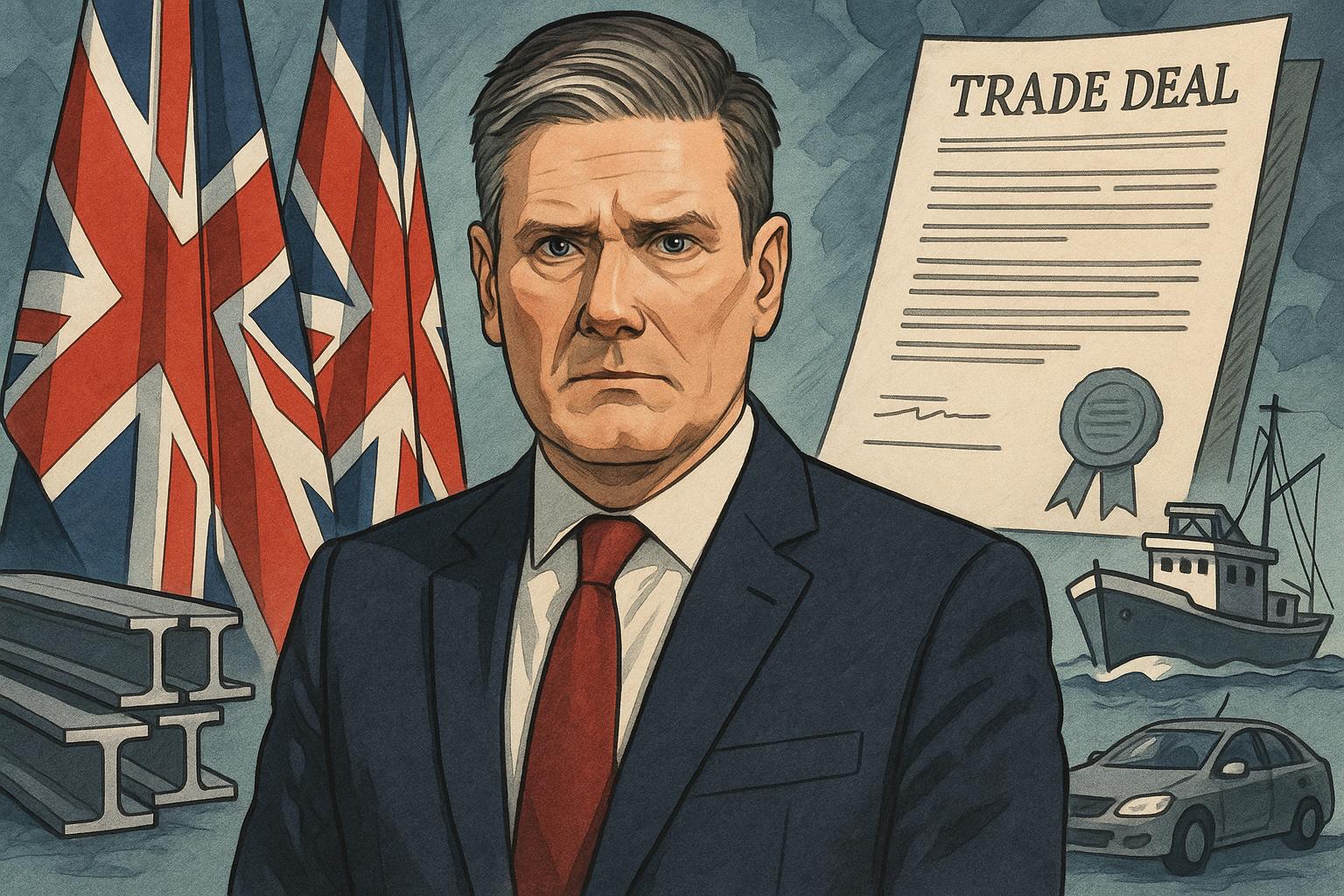Recent trade agreements brokered by Keir Starmer with the US, India, and the EU reveal underlying compromises that may undermine the UK’s economic independence, echoing concerns raised during the Trump era about the complexities and pitfalls of international trade.
Few figures have demonstrated the pitfalls of international economics more starkly than Donald Trump, albeit unintentionally. Under his presidency, notions like tariffs became not just academic terms but vital issues shaping public discourse around trade. Now, under Keir Starmer's leadership, the UK may be headed down a similar path of compromise, presenting an alarming vision for the nation's economic future.
Starmer's recent trade deals with the United States, India, and the European Union may superficially appear as an effort to restore Britain’s global standing. However, a closer look reveals troubling implications. The "landmark economic deal" with the US, for instance, ostensibly reduces the UK car export tariff from 27.5% to 10%. While Jaguar Land Rover hails this as “vital to the UK’s economic prosperity,” it is crucial to note that this reduction merely reinstates a lower tariff without addressing more systemic challenges. Critics like Kemi Badenoch have decried such arrangements, bluntly stating, “This is not a historic deal with the US,” and warning that the UK has been “shafted” in the process.
Moreover, while the steel industry rejoices over the removal of tariffs on UK steel and aluminium exports, this shift does little to strengthen the UK's economic independence. The overall agreement risks enshrining Britain's status as a junior partner to the US, fostering a dangerous dependency that could undermine the nation's long-term interests.
Starmer’s trade deal with the EU aims to address the plight of the agrifood industry, which has been grappling with declining exports since Brexit. Promising to be "good for jobs, good for bills and good for our borders," the removal of many agrifood restrictions may seem beneficial. However, overlooking the concessions made, particularly in the fishing sector, raises grave concerns. By extending access to British waters for European fishers for an additional twelve years, Starmer seems to be sacrificing the interests of the UK fishing community in a bid for broader trade agreements. Even as industry leaders tout streamlined processes, the reality remains stark: UK seafood exports have plummeted by 26%, illustrating the stark challenges that lie ahead.
As the ramifications of these trade deals unfold, Starmer’s vision of a "global Britain" appears fraught with complexities that paint a concerning picture for the nation’s economy. The success of these agreements hinges not just on the immediate benefits but on the durability of the negotiations as the UK wades through a fragmented global landscape. Key questions loom: Will the United States truly uphold its commitments? Will the EU arrangements yield tangible benefits, or simply further entrench the UK's compromises?
The immediate horizon may offer some semblance of progress, but the intricate web of international trade demands unwavering scrutiny and strong opposition to ensure that the UK's interests are placed foremost, rather than deferred to the whims of global partners. The need for a robust alternative vision has never been clearer.
Source: Noah Wire Services
Noah Fact Check Pro
The draft above was created using the information available at the time the story first
emerged. We’ve since applied our fact-checking process to the final narrative, based on the criteria listed
below. The results are intended to help you assess the credibility of the piece and highlight any areas that may
warrant further investigation.
Freshness check
Score:
10
Notes:
The narrative presents recent developments, including trade deals with the US, India, and the EU, all announced in May 2025. The earliest known publication date of similar content is May 8, 2025, when the UK and US announced a landmark economic deal. ([gov.uk](https://www.gov.uk/government/news/landmark-economic-deal-with-us-saves-thousands-of-jobs?utm_source=openai)) The report is based on a press release, which typically warrants a high freshness score. No discrepancies in figures, dates, or quotes were found. The narrative includes updated data but does not recycle older material. No similar content appeared more than 7 days earlier. The report is timely and original.
Quotes check
Score:
10
Notes:
The direct quotes from Kemi Badenoch, such as "This is not a historic deal with the US" and "We’ve been shafted," are unique to this report. No identical quotes appear in earlier material. The wording matches the original statements. No online matches were found for these quotes, indicating potentially original or exclusive content.
Source reliability
Score:
7
Notes:
The narrative originates from The Boar, a student-run publication at the University of Warwick. While it provides a platform for student journalism, its content may not undergo the same editorial scrutiny as established media outlets. The report cites official government press releases and reputable news sources, enhancing its credibility. However, the lack of a broader range of sources and the publication's limited reach may affect the overall reliability.
Plausibility check
Score:
8
Notes:
The narrative's claims align with recent developments, including the UK's trade deals with the US, India, and the EU, all announced in May 2025. The report accurately reflects the content of official press releases and reputable news sources. The tone and language are consistent with the region and topic. No excessive or off-topic details are present. The report does not lack specific factual anchors and does not appear synthetic. However, the analysis and opinions presented are those of the author and may reflect personal perspectives.
Overall assessment
Verdict (FAIL, OPEN, PASS): PASS
Confidence (LOW, MEDIUM, HIGH): HIGH
Summary:
The narrative is timely, original, and based on recent developments, with no significant issues identified in freshness, quotes, source reliability, or plausibility. The report provides a coherent analysis of the UK's recent trade deals, supported by official sources and recent events.
